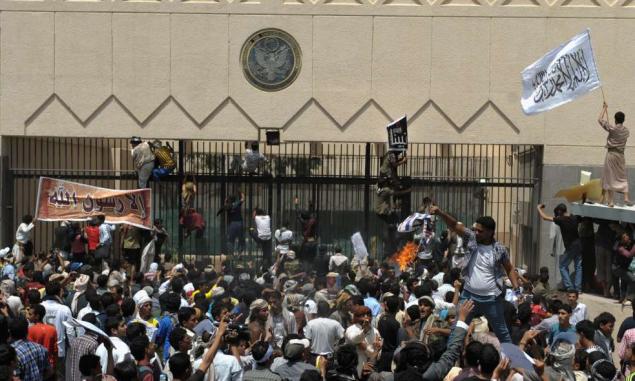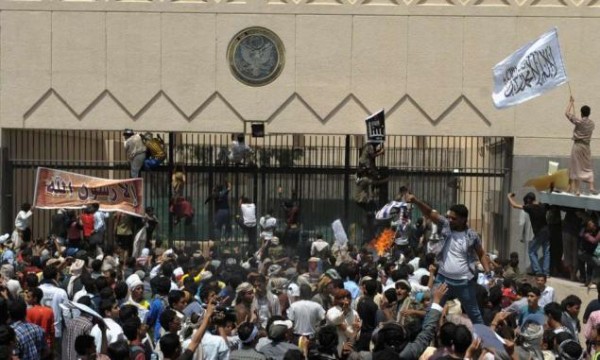
Angry demonstrations against an anti-Islam film made in the US have spread to several countries across the Middle East and North Africa.
Clashes between police and demonstrators near the US embassy in Sanaa on Thursday killed four people, a security official said.
“Four people were killed and 34 others were wounded in the clashes that lasted from morning until late in the evening” in the area around the US embassy in Sanaa, the official said.
Earlier on Thursday, a security official said that Yemeni police shot dead a protester in confrontations outside the embassy, shortly after ejecting crowds that briefly stormed the mission’s compound.
The protesters removed the embassy’s sign on the outer wall and brought down the US flag and burned it, according to witnesses.
A number of diplomatic vehicles were torched as security forces used water cannons and warning shots in a bid to drive them out.
In Egypt, 224 people were injured in protests, eight of whom needed to be transfered to hospital, the health ministry said.
In Libya, where the US ambassador and three embassy staff were killed during protests in Benghazi on Tuesday, officials said they had made “four arrests” over the attack.
In the Iranian capital, Tehran, up to 500 people protested over the issue chanting “Death to America!” and death to the movie’s director, an AFP photographer at the scene said.
The rally, near the Swiss embassy that handles US interests in the absence of US-Iran diplomatic ties, ended peacefully two hours later.
US flags burned
Meanwhile, Egypt’s President Mohamed Morsi has condemned the film that has sparked an outcry in his country.
“We Egyptians reject any kind of assault or insult against our prophet. I condemn and oppose all who… insult our prophet,” Morsi, on an official visit to Brussels, said in remarks broadcast by Egyptian state television.
“[But] it is our duty to protect our guests and visitors from abroad… I call on everyone to take that into consideration, to not violate Egyptian law… to not assault embassies,” he added.
Egyptians have clashed with police outside US embassy in the capital, Cairo, for the third day.
About 30 people have been injured, including more than 10 riot police in the overnight clashes, as the fallout from a film ridiculing Islam’s prophet continued to rage on Thursday.
Police have used tear gas to disperse the crowd, as interior ministry said at least 12 people have been arrested.
American flags were also burned in Tunisia, outside the US embassy in the capital, Tunis.
Police fired tear gas at demonstrators who shouted their opposition to the film, and chanted slogans against the US.
A small crowd also burned an American flag in Gaza City where Hamas, the elected government there, has condemned the film.
Despite the Egyptian government’s call for calm, protesters chanted in the streets and fires burned.
Innocence of Muslims, the film that mocked Prophet Muhammad, was allegedly produced in the US by a filmmaker with ties to Coptic Christian groups, and excerpted on YouTube with dubbing in Arabic.
On Wednesday, about 200 demonstrators took part in protests in the Egyptian capital.
They rallied into the night chanting “leave Egypt” but there was however no repeat of the previous day’s events when angry crowds climbed the walls of the complex and tore down an American flag, which they replaced briefly with a black, Islamist flag.
YouTube block
Meanwhile, YouTube, the video website owned by Google Inc, has said it will not remove the film clip, but it has blocked access to it in those countries.
The Afghan government has ordered an indefinite ban on YouTube to prevent access to the film deemed offensive to Muslims, officials said on Thursday.
The US prosecutor-general said on Wednesday that four people were being questioned after Tuesday’s events.
Nine Coptic Egyptian-Americans were also put on an airport watch list. They are believed to have contributed to the production of the anti-Islam film that led to the embassy protest.
The man behind the protests told Al Jazeera he just wanted to combat insults against Islam through legal and peaceful means. Wesam Abdel Wareth, the protest organiser, said his group was not happy that young people who joined their protest brought down the US flag.
He also said there was no co-ordination with protesters in Libya, and he condemned the violence there.
On Tuesday, Egypt’s prestigious Al-Azhar mosque condemned a symbolic “trial” of the Prophet organised by a US group, including Terry Jones, a Christian pastor who triggered riots in Afghanistan in 2010 by threatening to burn the Quran.
But it was not immediately clear whether the event sponsored by Jones also prompted the embassy events.
Egypt ‘neither enemy, nor ally’
Meanwhile, US President Barack Obama has called the leaders of Egypt and Libya to discuss security co-operation following the violence in Cairo and Benghazi, the White House has said.
Obama urged Egypt to uphold its commitments to defend US diplomatic facilities and personnel and called on Libya to work with US authorities to bring those behind the deadly attack on the US consulate to justice.
Morsi promised Egypt “would honour its obligation to ensure the safety of American personnel”, the White House said.
Obama told Morsi that while “he rejects efforts to denigrate Islam … there is never any justification for violence against innocents”.
Whatever the cause, the events appeared to underscore how much the ground in the Middle East has shifted for Washington, which for decades had close ties with Arab dictators who could be counted on to crush dissent.
Obama’s administration in recent weeks had appeared to overcome some of its initial caution after the election of Morsi, offering his government desperately needed debt relief and backing for international loans.
Egypt is neither an ally nor an enemy of the United States, Obama said on Wednesday.
“I don’t think that we would consider them an ally, but we don’t consider them an enemy,” Obama said in excerpts of an interview with Telemundo aired by MSNBC.




